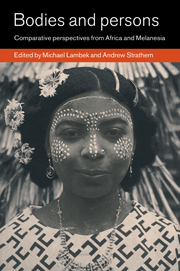Book contents
- Frontmatter
- Contents
- List of illustrations
- List of contributors
- Acknowledgments
- 1 Introduction: Embodying sociality: Africanist–Melanesianist comparisons
- Part I Transcending dichotomies
- Part II Transitions, containments, decontainments
- Part III From exchange to history
- 9 Creative possessions: spirit mediumship and millennial economy among Gebusi of Papua New Guinea
- 10 Dis-embodiment and concealment among the Atbalmin of Papua New Guinea
- 11 Melpa and Nuer ideas of life and death: the rebirth of a comparison
- 12 Afterword: embodying ethnography
- Bibliography
- Index
12 - Afterword: embodying ethnography
Published online by Cambridge University Press: 05 June 2012
- Frontmatter
- Contents
- List of illustrations
- List of contributors
- Acknowledgments
- 1 Introduction: Embodying sociality: Africanist–Melanesianist comparisons
- Part I Transcending dichotomies
- Part II Transitions, containments, decontainments
- Part III From exchange to history
- 9 Creative possessions: spirit mediumship and millennial economy among Gebusi of Papua New Guinea
- 10 Dis-embodiment and concealment among the Atbalmin of Papua New Guinea
- 11 Melpa and Nuer ideas of life and death: the rebirth of a comparison
- 12 Afterword: embodying ethnography
- Bibliography
- Index
Summary
Entering upon this discussion is like sitting down to a sumptuous meal: one is faced with such abundance that it is difficult to know where to start. I propose, therefore, to nibble, proceeding somewhat eclectically from thought to thought as the palate leads. What follows is offered in the spirit of exchange: by consuming these essays and engaging them my aim is to fortify existing relationships and to elicit rather than define. Headings do not signal discrete jumps in fare, but convocations in the flow.
On comparing
Readers will surely have noticed that the ethnography presented here pays meticulous heed to detail, its authors refusing to disdain the prosaic but plumbing it for keys to understanding instead. The subtlety with which cultural logics are parsed and bodily practices explored distinguishes this work from the sweeping statements and grand generalizations of earlier comparative projects. Absent too are the static “structures” on which past correlations between Africa and Melanesia were made to hinge. Where such ventures reduced ethnographic descriptions to artifactual common coin, minted from investigations in one place and circulated to humanity as a whole, contributors here ground themselves in positioned practices, persons, relationships, and ideas. They deploy images of movement and fluidity, accenting process, indeterminacy, fluxes and flows, sociality and relatedness instead of formal rules, and above all, practice – the active engagement of persons in their worlds – over categorical essence. Through such radical specificity more refined and nuanced comparison now proceeds.
- Type
- Chapter
- Information
- Bodies and PersonsComparative Perspectives from Africa and Melanesia, pp. 252 - 273Publisher: Cambridge University PressPrint publication year: 1998
- 10
- Cited by



